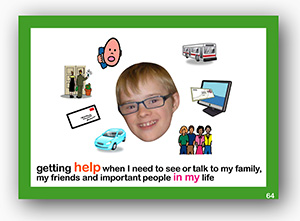It’s over two years now since the I have the Right flashcards for young people with disabilities were first distributed. In the intervening time hundreds of packs have gone to the adults who work with young people in care in foster homes, residential care and youth justice.
Rebecca Munn, Program Coordinator – Children’s Therapeutic Accommodation Service at CARA, is one who has made use of the cards in her work with young people in CARA’s residential care facilities and emergency respite care.
‘They have been useful to me in starting conversations with young people about difficult issues like safety and personal space.
‘We refer to the rights in the Charter of Rights all the time but the written language doesn’t have much meaning for young people with limited literacy. The symbols and the faces on the cards can be cues for a good one-to-one discussion about a young person’s rights.
‘The Charter of Rights posters are displayed but sometimes we might take out a single right from the long list and make up our own poster specially for one young person, perhaps with a photo of the young person themselves.
‘We can also use the cards to talk about how to raise issues with other people. The right to nutritious food can help us talk about how they may ask for a change in the menu or the right to private space can look at ways to ask someone not to keep coming into your room.
‘Many of our young people have a good idea of their own rights but are less able to see how their behaviour can affect the rights of others. We are trying to help them live together with other people while they are with us and when they move on into other social situations. Discussing the rights of others can be a good way to tackle behaviour that is not appropriate.
‘We mix up the various ages and genders of the cards to suit our needs. Using the cards designed for older ages with the younger children can be useful to talk about their futures and what they will be doing when they are older.
‘From the ages of 14 or 15 we are talking with our young people about transitioning to the adult world or to other care situations. Issues like mobile phones, going out, social media, how you present yourself to the world, typical teenage stuff, are coming out. It would be good to have another set of cards for teenagers and young adults that we could use to start talking about these kinds of issues.
‘We use a lot of techniques like exploring social stories or enacting situations in role plays to create a space to work with our young people, but rights are often the key and the cards are a good tool for discussing rights.’


